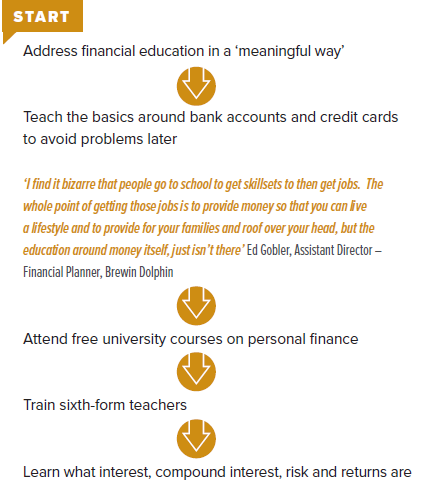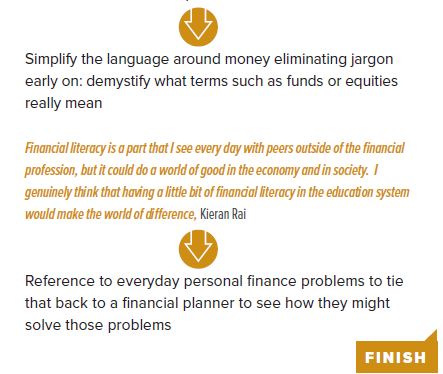Financial education should be an essential subject in schools, financial professionals argue, as the emergency for financial literacy becomes more pronounced during the crisis.
Speaking at a virtual roundtable organised by PIMCO and Citywire as part of a series of regional events, wealth managers and financial advisers in the South West highlighted the importance of financial literacy, how to make advice more accessible and how Covid-19 has ‘pressed a fast-forward button’ on technology.
‘I genuinely think that having a little bit of financial literacy in the education system would make the world of difference,’ said Kieran Rai, account manager at asset management group PIMCO.
According to Ed Grobler, assistant director at wealth manager Brewin Dolphin, the level of financial education in schools is ‘massively lacking’ and until this issue is addressed in a meaningful way, there will always be gaps in people’s understanding of money.
Even the relationship between depositing cash in a bank account and investments is not properly understood, but Grobler argued that if people left school with that basic understanding, explaining funds or equities further down the road would be easier.
‘It’s almost expected that people learn about money by making basic mistakes, like going a bit crazy with a credit card and then getting laden with debt and having to clear it,’ he said. ‘That’s how you learn those lessons in life unfortunately. It would be better if there was just a bit more financial education in the system.’
Keith Edwards, chief executive of Casterbridge Wealth, wished he could have taken a course when he was 18 on how to buy a house, for example. ‘I’d have been doing something far more interesting, clearly, because I was 18 to 22, but at the same time there should be the opportunity.’
For PIMCO’s Rai, one way firms can address this is by showing how financial planning can solve everyday problems. ‘Financial advice is not necessarily intuitive in a lot of people’s minds, but there are goals that financial advisers can seek to achieve and help you achieve that are very relatable, and they are increasingly important among individuals.
‘So, focusing more on the common pain points many face and educating them by putting out the message that financial advisers can help you in these instances could be one way to increase the number of people who take financial advice.’
Providing financial education at a younger age will not only help get more people to take advice, but will also attract graduates to the profession.
‘It’s almost expected that people learn about money by making basic mistakes, like going a bit crazy with a credit card and then getting laden with debt and having to clear it’
Ed Grobler, Brewin Dolphin
Diane Weitz, managing director of Ashlea Financial Planning, agreed. Although it does not directly relate to financial advice, even learning about more basic things like how to run a bank account, what a credit card is or what it means when it says 19% APR on an account would be useful so that people have the fundamental skills that are needed to be able to cope with life, she argued.
In addition to teaching people about financial planning, she believes more needs to be done to get the message across that it can be an attractive profession. Recalling her time working in direct sales at merchant bank Hill Samuel, she said there was not a clear career path. But now that has changed and the industry needs to show that it is a valid career for people.
‘In terms of financial planning, we have a real problem in that people don’t understand what we do. There is a communication problem here. It’s interesting because when people are thinking about careers, they might think about law or accountancy, both of which are really quite closely linked to financial planning, but not quite as interesting,’ she said.
‘People don’t think about financial planning as a career,’ she continued. ‘This is a massive obstacle to overcome, to try and get financial planning accepted as an interesting and stimulating career along with the other professions. We still have a long way to go because most people simply don’t understand what a financial adviser does.’
Echoing this, Isabel Sinclair, director at PFM Associates, also believes that financial planning is still not regarded as a profession. In her opinion, accountancy, for example, is always seen as a clear route to a professional role. ‘But financial planning hasn’t gotten there yet and we really need that to be highlighted,’ she stated.
Weitz’s firm, Ashlea Financial Planning, is looking to set up placements with Gloucester University, and she suggested that the industry should do more to develop roles for graduates.
Casterbridge Wealth is doing something similar. The firm has been working with Bournemouth University and is currently on its second rotation of accepting work placements, said Edwards.
The panellists also discussed how to make financial advice more accessible to overcome some of these issues, with Grobler suggesting a greater use of clear and concise language.
‘By talking in normal language and not overcomplicating the subject matter; the ability to take complex things and communicate them in a simple way – these are key,’ he said.
‘For example, cashflow modelling is something that does that really well. It can illustrate the key benefits of getting advice and how one scenario is better than another. So rather than having to convince someone through the use of language why pensions are better than whatever else, park the product talk for a moment, remove pointless jargon and simplify what we do.’
Technology vs face-to-face
While the coronavirus pandemic has been ‘horrific’, in the long term Grobler believes there will be positive consequences, such as the rise in connectivity.
With older generations being forced to use technology, he said it is ‘as though someone has pressed a massive fast-forward button’.
Previously, carving time out for a face-to-face meeting with busy clients, particularly when it meant travelling from one city to another, required a lot of resources, said Grobler. While in the past, the other options available were ‘clunky and really problematic’. Now, the ‘kit is getting better and better’ and you can have the exact same catch-up virtually.
Weitz, who believes her firm will do a mix of face-to-face and virtual meetings post-Covid-19, has found the use of technology particularly useful as she prepares to transition her clients to her colleague in anticipation of her retirement next year.
‘Zoom meetings have really been quite good for that, because it means that when we’re talking my colleague is able to have all the stuff we have about the clients up on screen. So, it makes it easier for him to ask questions,’ she said.
‘I think Zoom meetings will continue, but I think it’s always going to be nice to meet face-to-face, at least once a year if possible.’
For Casterbridge’s Edwards, it is important to remember that human experience is in 3D and not 2D: ‘When was the last time we did a Zoom quiz? We got a lot of those in March and April, anyone seen one lately? When was the last time anybody made a video of them cooking something for their people on Facebook? We have not been doing this as much lately. It has now become a utility. We now use it like you would a phone, like you would an email and it’s not a panacea.’
‘People don’t think about financial planning as a career. This is a massive obstacle to overcome, to try and get financial planning accepted as an interesting and stimulating career along with the other professions’
Diane Weitz
He also brought up how this new normal of working from home can impact people’s mental health.
‘The human contact almost has to be planned because you can just drift into that situation where people haven’t seen another person for three months and that’s not okay,’ he said. ‘So, we’re taking action on that.
‘We are preparing for a full lockdown at the end of October, which I think we’re all expecting for half term. It may or may not happen, but we need to prepare for it. From here through to March, we just need to make sure that we look after our colleagues, but also our clients, just to make sure we keep in touch. Zoom is great and it’s been fantastic over the last six months, as are 365 Teams and all the rest of them, but it’s not the only solution and it’s not a panacea, certainly not.’
For PFM Associates’ Sinclair technology is an enabler but definitely not a ‘be-all and end-all of life’.
She said the key to a long-term relationship with a client is trust. It is about getting to know the client, and the client getting to know their adviser. And for that, she argued that face-to-face meetings are particularly key.
‘The important thing is, at the end of the day, your client trusts you with more information than they do the rest of their family. You become almost a family friend and the way you do that is by listening and empathising,’ she said.
She believes that it is difficult to maintain this type of relationship with clients over video calls, as there is no proper eye contact and no body language.
‘I appreciate that my clients are the older generation and while they’re quite happy to use their mobiles, they don’t want to have to use all the technology they supply. They want to see you, they want to talk to you, and they want to have a cup of tea with you,’ she explained.
‘That’s so important and it’s the same with colleagues, we’re not communicating properly at the moment because we’re all having these meetings, but we’re not off the cuff, we don’t pop into one another’s offices to chat about things, and that’s how business works. I do not see it as the end-result that everybody will be doing everything by technology. It’s part of our business and it’s enabled us to keep in contact with clients, keep things going, but it will never replace face-to-face.’
But she admitted that there has been a definite improvement in the service her firm provides clients, particularly for some who ‘didn’t get that much visibility of us in the past’. Because she has been able to contact clients remotely using the different technology platforms available, she said clients – who are typically dotted around the country – have had more contact from PFM Associates.
On the asset management side, Rai said it was very clear at PIMCO when things took a turn for the worst that their clients were really busy and it was time for the business to ‘pay something back and find other means to maintain their level of service.
The group responded to this challenge by sending out daily emails filled with useful market insights. After some time, he found that their wealth manager and financial adviser clients were more willing to talk and understand opportunities in the market, although since then this has all been done via videoconferencing.
‘I think it is lovely that we are saving time on travelling so we can focus on other things, like being more proactive with clients and hopefully deliver a higher quality of service, but I do agree that there is an absence of the same level of human connection with video conferences and Zoom meetings, and the human interaction part of what we do is fundamentally important,’ Rai said.
‘So just to echo what others have said, and it is something that has been a bit of a revelation to me through this discussion but face-to-face interaction will always be important, and hopefully we do get past this blip as fast as possible.’



